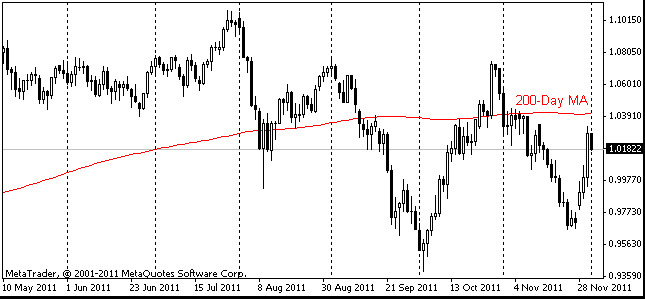EUR/usd
Greek Prime Minister Lucas Papademos has signaled that he is close to reaching the agreement over further austerity measures with the three major parties of the country. The agreement was to be concluded on Tuesday evening, but the event was postponed to Wednesday. Nevertheless, the markets reacted very positively to this news. The single currency jumped from 1.31 to 1.3260. As we know, such sharp jumps are caused by the negative positioning against the euro. The abundance of short positions triggers bursts in the euro on any rumors. However, facts shouldn't be overlooked either. Yesterday Destatis published very poor statistics on the industrial production in Germany, showing a decline of 2.9% m/m and 0.9% y/y. It proved much worse than expected. Still, market participants hold out hope that the trend towards increasing business sentiment indexes is of great importance and soon will have a positive impact on the real economy. Time will show. Despite the positive news from Europe, the U.S. stock markets showed rather cautious growth: new highs are being taken with caution. The Fed's chief in his turn gave quite restrained comments about Friday's positive data on the labour market when speaking before Congress yesterday. He pointed out that the recovery is extremely slow. Basically, his speech was focused on the call for legislators to decide on the extension of the Bush tax cuts as soon as possible since uncertainty can considerably unsettle the markets.

GBP/USD
As expected UK's shop inflation is still decreasing. The data from the BRC published overnight showed that prices in January rose by 1.4%y/y, compared to 1.7% in December. The price growth is mainly concentrated in the food sector, where inflation is 3.7% y/y. In the non-food sector the price increase is zero, which is really surprising with regard to a considerable upward pressure from the transport and energy sectors. Sellers are trying their hardest to curb inflation in order to keep their customers. The British pound, meanwhile, has already crept up to 1.59, which is very close to the 200-day moving average, now passing through 1.5935. Bulls are unlikely to give in without trying to reach this level.

USD/JPY
The Japanese currency keeps retreating against the dollar. It's happening largely due to the intensive growth of Asian bourses, which spurs the risk demand by funding the Japanese yen. Interestingly enough, the long-term resistance level in the downtrend has already been broken through. Formally, this happened two weeks ago, but then the pair managed to reverse and close the week at the lower levels. Maybe, this week USD/JPY at last will be able to settle down above this line, which is now passing through 76.80. At the moment the trade is held around 76.95.

AUD/USD
After RBA's surprising decision to leave rates unchanged the Australian dollar rushed up to the maximum of 1.0822. However, during the rest of the day the pair didn't manage to show any impressive dynamics despite the growth in other markets. Today the pair has been moving between 1.0780 and 1.0820. The aussie didn't support the rally of European currencies as well as purchases of gold yesterday at the end of the day. It looks as though bulls had got tired and decided to take a time out.
